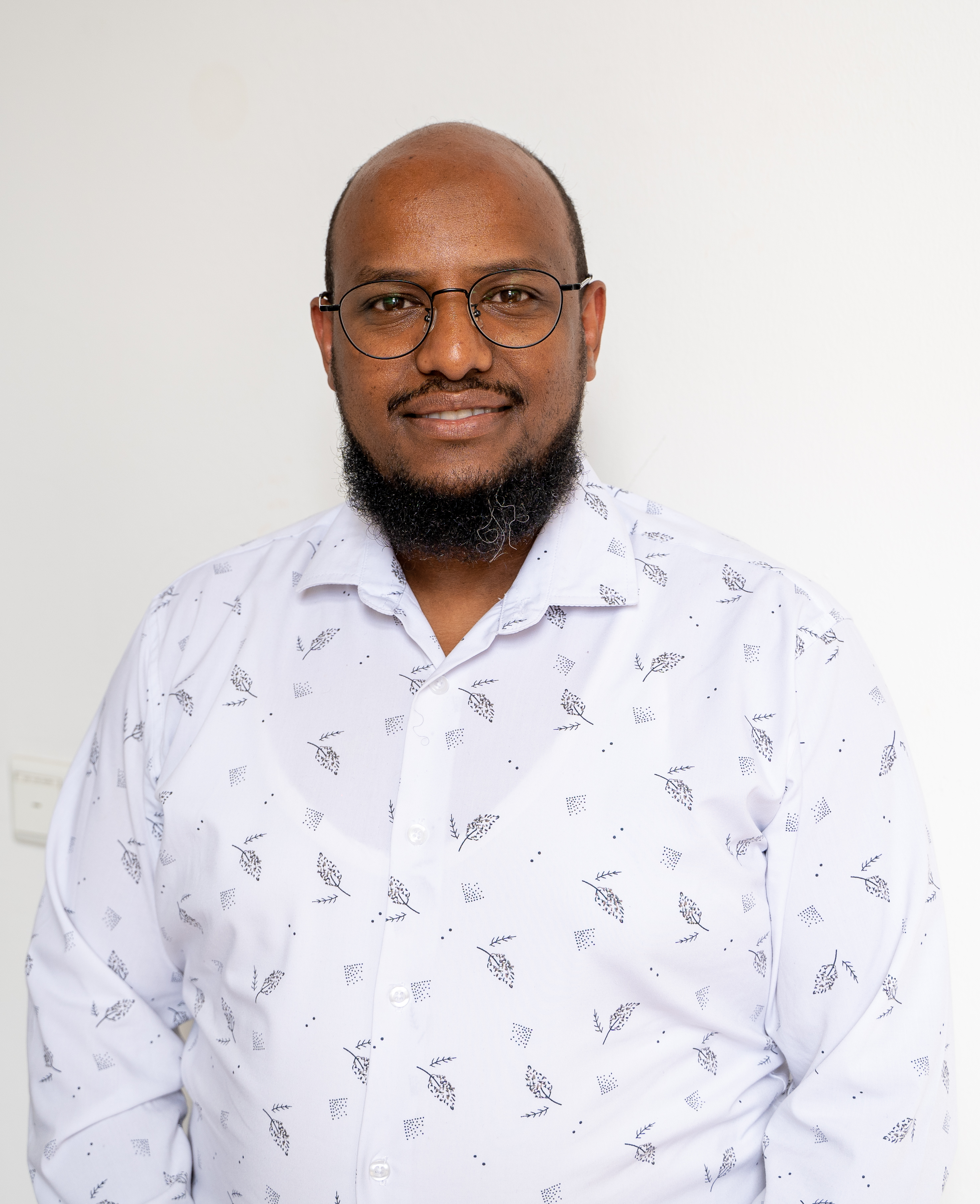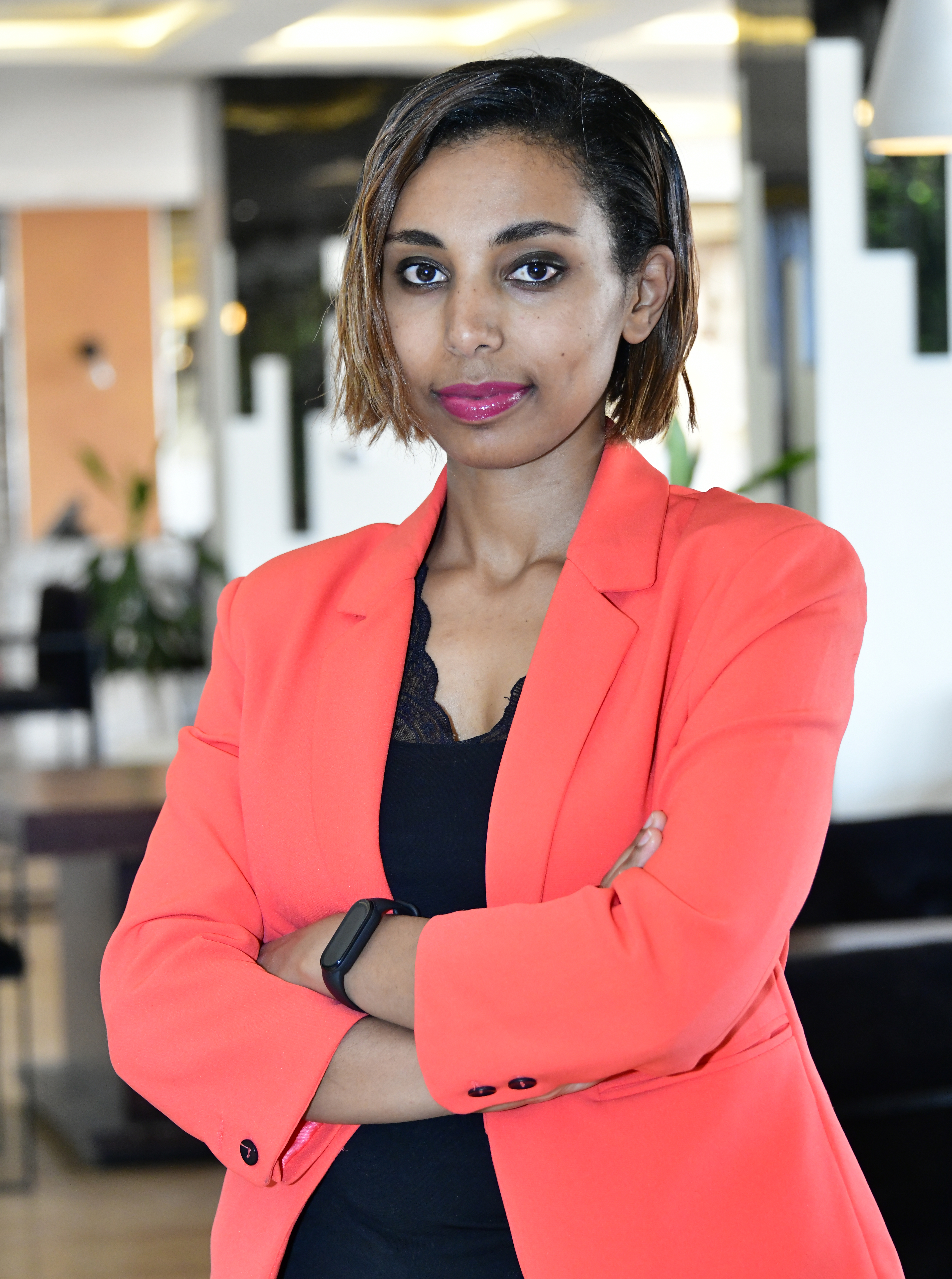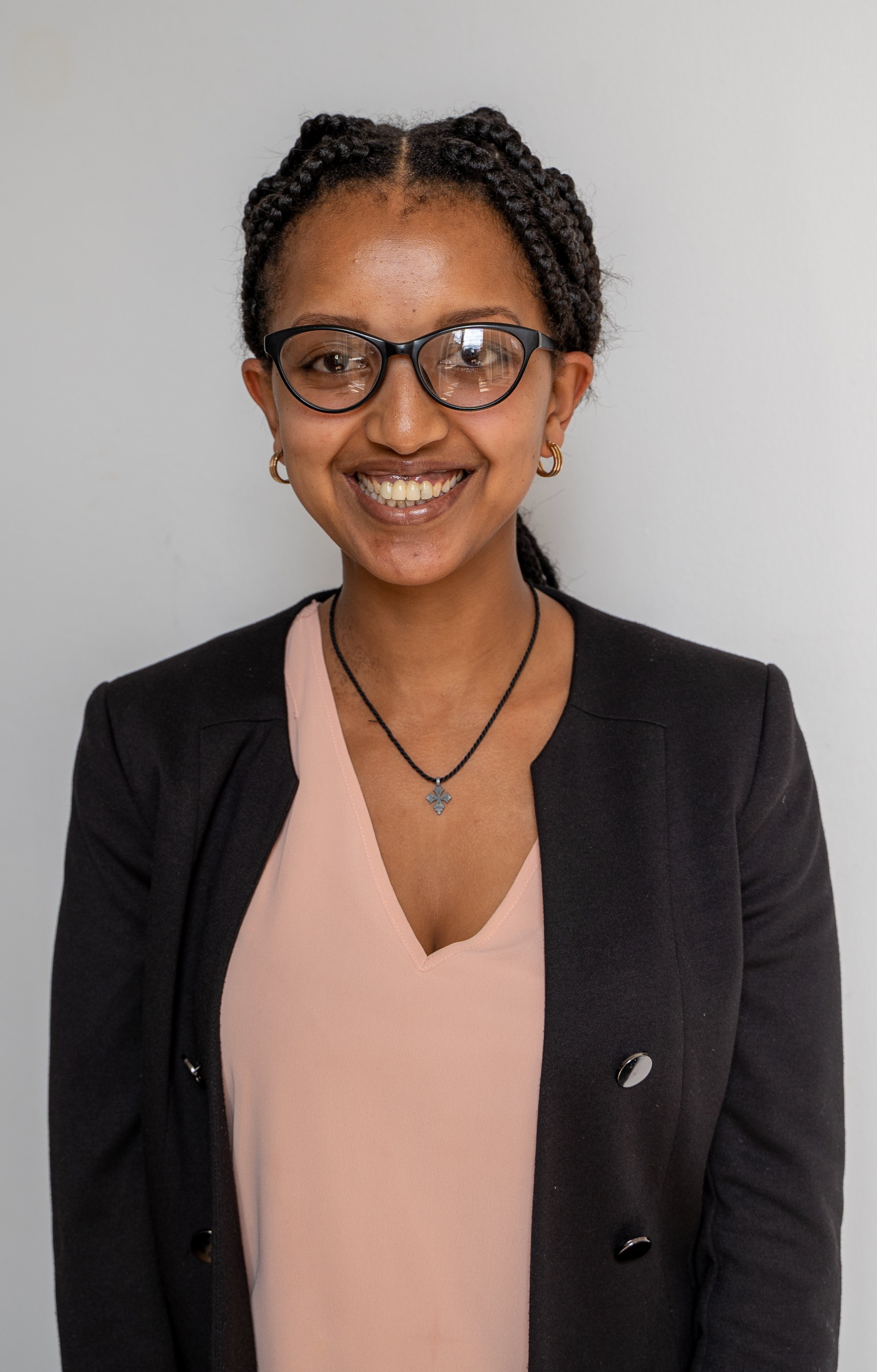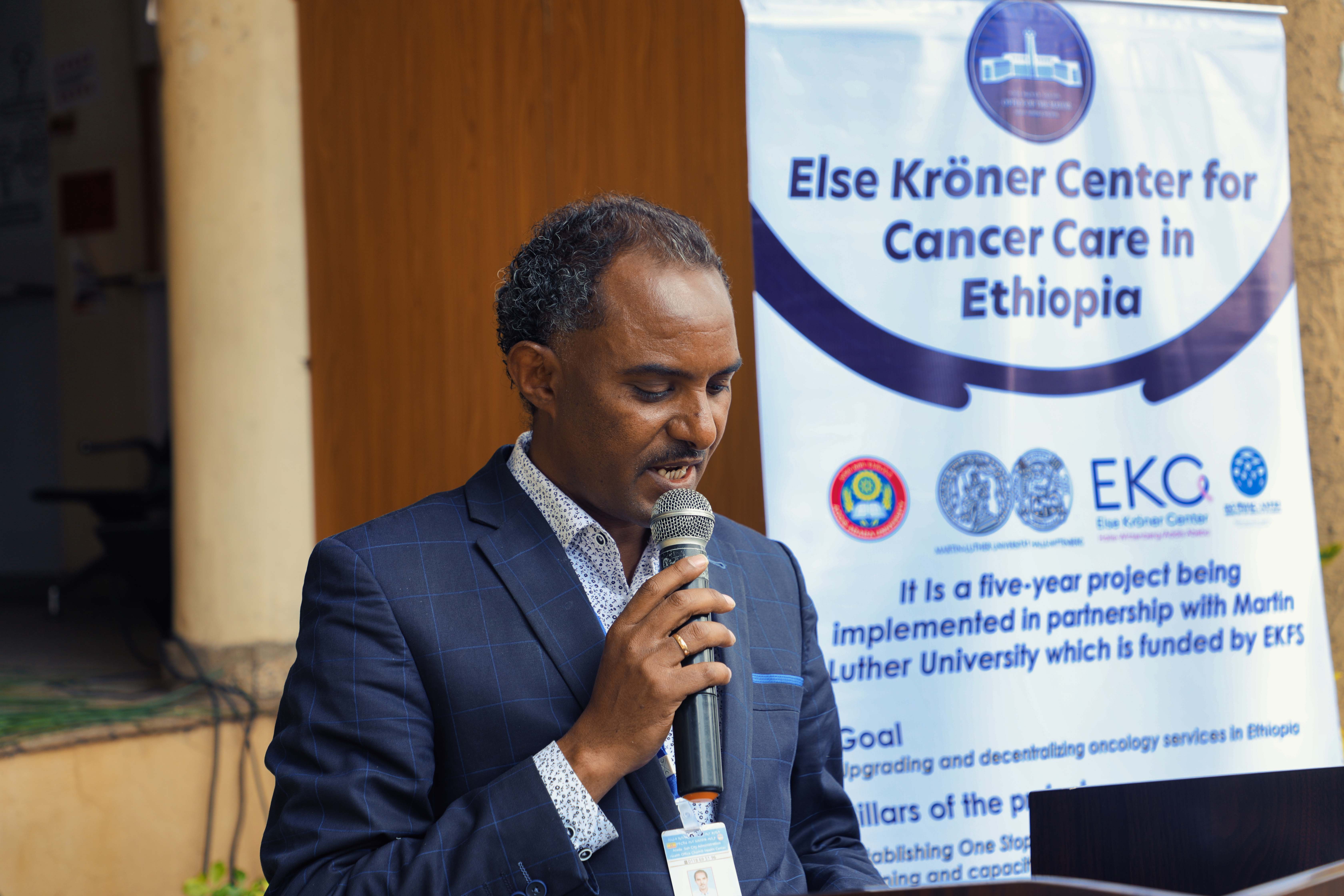
Contact: Prof. Eva Kantelhardt and Claudia Spielmann
Duration: 1.2.2020 - 31.1. 2026
Funding: Else Kröner-Fresenius-Stiftung
Website of project partner: https://ekcc.aau.edu.et/
Summary:
2.5 million euros: This sum was granted by the Else Kröner-Fresenius-Stiftung to support the development of the “Else Kröner Cancer Center”, based at Addis Ababa University in the capital of Ethiopia within a 5 year time frame. The responsibility for this humanitarian project lies with the Medical Faculty of the Martin-Luther-University Halle-Wittenberg and Dr. Eva Kantelhardt. She is a gynecologist and epidemiologist having been involved in the African country for around ten years. In close collaboration with an interdisciplinary team led by Dr. Adamu Addissie of Addis Ababa University, Dr Kantelhardt is involved in promoting the prevention and care of malignant diseases, especially breast cancer and cervical cancer, in Ethiopia.
The cancer center based in Addis Ababa, Ethiopia is one of two projects that the Else Kröner-Fresenius-Stiftung selected from 78 applications. “Cervical cancer and breast cancer are the most common cancers in Ethiopia. The project shall support both patients and research activities on these diseases to provide data on access to care. Around 13,000 people are diagnosed with these diseases each year. Unlike in Germany, around two thirds of the Ethiopian patients diagnosed with cervical and breast cancer decease of the disease,”emphasizes Dr. Kantelhardt. In particular, early detection of cancer which is essential to the curability of cancer, must be improved.
Funding of the EKFS therefore primarily serves to establish an earlier diagnosis and, consequently, earlier therapy. "All of this happens in close coordination with the colleagues in Addis Ababa," Kantelhardt says. This includes the purchasing of equipment, but also the optimization of processes. The new cancer clinic will also serve as a training- and education site for the employees of the new regional oncology centers. There are plans to closely work with eight rural regional hospitals and their health centers to optimize the planned nationwide cervical cancer screening. In addition, a community-level system will be developed level to provide long-term psychosocial support for cancer patients within the existing local structures.
I support EKC because...

My name is Munir Awol and I am an oncologist in Addis Ababa, Ethiopia. The Else-Kröner project offered me the opportunity to attend the summer school in Halle in May 2024 to deepen my understanding of cancer research in Ethiopia. Through this experience, I was able to gain valuable insights and expand my knowledge.
As an oncologist, I focus on the diagnosis and treatment of cancer. Through continuous research and education, I strive to improve the care of cancer patients in a sustainable way. For me, as head of the oncology department at Black Lion Hospital, the EKC is a key factor in improving the research capabilities of staff and trainees in the field of oncology. It supports patients in various programs ranging from psychosocial support to better access to specialized treatments. The EKC helps patients by improving access to early diagnosis through screening and early detection programs as well as timely surgical treatment for breast cancer patients.

My name is Lense Yadete, I am a physician in Addis Ababa and currently the coordinator of the Else Kröner for Cancer Care project. I take a supporting role as coordinator in the project in Addis Ababa. Together with my team, we are currently researching the experiences with our One-Stop Cancer Center. I ensure a smooth delivery of services by coordinating communication between the different departments working together.
EKC supports patients by providing much-needed cancer treatment at the primary health care level, which is difficult for many Ethiopian women and mothers to access. And that is so worth it. Bless you.

Veronica Afework, a 32-year-old general and breast surgeon, has made significant progress in her career as a breast surgeon thanks to the EKC project in Ethiopia.
Thanks to an exchange program at the University Hospital Halle (UKH) in Germany, she was able to significantly improve her surgical skills. "I had the opportunity to assist in complex procedures such as lumpectomies, mastectomies, breast reconstructions and sentinel lymph node biopsies," reports Afework. This experience expanded her clinical knowledge and decision-making skills.
Another milestone was her participation in the research summer school in Halle. "This experience significantly expanded my research skills and my professional network," she says. The summer school helped her to develop a deeper understanding of statistical methods and the interpretation of data.
Her newly acquired skills are directly incorporated into her research project: "Breast cancer surgical care and lived experience of patients after mastectomy, treated at a tertiary hospital and a One stop breast center in Ethiopia". This project aims to improve the care of breast cancer patients in Ethiopia.
Afework is an outstanding example of how international cooperation and training can advance medical care in developing countries.

My name is Antje Henke and I am an expert in cancer prevention with a focus on sub-Saharan Africa. I am currently involved in the scientific project management of the EKC project at the University of Halle and, from August, in Moshi, Tanzania.
The Else-Kröner-Center for Cancer Care is a key player in primary care for women and contributes significantly to increasing cancer awareness and empowering patient groups and their relatives. Through scientific cooperation between partner universities, we promote the implementation and evaluation of new projects as well as the mutual exchange of knowledge.
My work in the EKC project aims to improve cancer diagnosis and treatment, in particular by coordinating and planning the optimization of screening diagnostics at the University of Halle. I am convinced that our innovative research approaches in cancer prevention research will make a significant contribution to patients.

Gelana Lulu Saketa, CEO of the Churchill Health Center in Addis Ababa, highlights the significant progress that the EKC project has made in the field of cancer care in Ethiopia.
"The EKC project supports women in the early detection, diagnosis and treatment of cancer in order to reduce morbidity and mortality," explains Saketa. The project not only provides medical devices and equipment, but also provides comprehensive training for healthcare staff to ensure high-quality care.
He is responsible for all management activities at the Churchill Health Center as part of the EKC project: He emphasizes how the decentralization of cancer care through the EKCC from the tertiary hospital to primary health care benefits patients. "Patients can now receive screening, diagnosis and treatment in one place with multidisciplinary teams of specialists," she says. This significantly reduces the waiting time for diagnoses and the waiting list, thus improving patients' prognoses and quality of life.
In addition, the Churchill Health Center plays an important role in research and data management, which supports the continuous improvement of cancer care in Ethiopia.
Gelana Lulu Saketa sees the EKC project as a crucial initiative that will sustainably improve the lives of cancer patients in Ethiopia and strengthen the country's healthcare infrastructure.

Sophie Rossner, a 25-year-old medical student from Halle (Saale), reports on her valuable experience with the Else Kröner Project as part of her doctoral thesis. The project supported her study on e-learning in primary health care in Ethiopia.
"My study provided a thorough initial evaluation and baseline assessment of e-learning for the DINKNESH project," explains Rossner. The DINKNESH project aims to develop an app for healthcare professionals to increase their knowledge about the prevention and treatment of breast and cervical cancer. This evaluation could serve as a model for similar projects in Ethiopia.
For Rossner, the EKC project is a unique opportunity to immerse herself in the world of research and gain valuable experience for her future career. "As a student, the EKC project offers me the chance to gain practical research experience and expand my knowledge," she says.
Rossner is working on this project at Global Health AG at Martin Luther University Halle-Wittenberg. Through her involvement, she is helping to improve medical training and healthcare in Ethiopia.
Sophie Rossner shows how international cooperation and innovative educational projects can improve medical care in developing countries.

